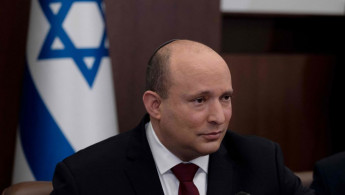Israel expresses its 'sorrow' to Saudi Arabia following Houthi attacks, blames Iran
Israel has expressed its "sorrow" to Saudi Arabia on Saturday following a series of attacks carried out by the Iran-backed Houthi rebels against targets in Saudi Arabia.
"This attack is further proof that Iran's regional aggression knows no bounds," Israeli Prime Minister Naftali Bennett tweeted.
Bennett's remarks came amid thawing relations between Israel and Saudi Arabia, who have a common interest in limiting Iran's growing influence in the region.
Both states recently expressed the desire to develop closer ties.
Saudi Crown Prince Mohammed bin Salman [MbS] even called Israel "a potential ally" earlier this month.
Saudi Arabia does not have diplomatic relations with Israel, but in 2020 Gulf allies Bahrain and the United Arab Emirates normalised ties with Tel Aviv, as part of a wave of US-sponsored controversial normalisation deals known as the "Abraham Accords".
The State of Israel expresses its sorrow to the Kingdom of Saudi Arabia after the horrific attack by the Iranian-backed Houthis.
— Naftali Bennett בנט (@naftalibennett) March 26, 2022
This attack is further proof that Iran’s regional aggression knows no bounds & reinforces the concern of Iran’s IRGC being removed from the FTO list.
Bennett's statement late on Saturday referred to the latest wave of Houthi drone and missile attacks, which targeted several locations in Saudi Arabia on Friday, including an Aramco oil facility in Jeddah.
The attack sparked a huge fire near Jeddah's Formula One circuit during televised practice sessions on Friday and drew international condemnation, including from the US, who said the strikes were "unacceptable".
Saudi Arabia launched retaliatory air strikes on Saturday against the Yemeni capital Sanaa and the key port of Hodeida, held by the Houthis. On the same day, Saudi officials announced that the Houthi rebels had proposed a ceasefire and peace talks in return for reopening Sanaa's airport and the port in Hodeida.
The Houthi strikes against Jeddah took place as Yemen nears the seventh anniversary of a Saudi-led coalition's military intervention against the Houthi rebels.
The Saudi-led coalition intervened to support Yemen's internationally recognised government in 2015, after the rebels seized the capital Sanaa the previous year.
The war has killed hundreds of thousands directly or indirectly and generated one of the world's largest man-made humanitarian crises.
Lifting the coalition's blockade on Hodeida could allow Houthis to revive some markets and bring in much-needed essential supplies into the country, engulfed in a massive famine.





 Follow the Middle East's top stories in English at The New Arab on Google News
Follow the Middle East's top stories in English at The New Arab on Google News
![The UAE is widely suspected of arming the RSF militia [Getty]](/sites/default/files/styles/image_330x185/public/2024-11/GettyImages-472529908.jpg?h=69f2b9d0&itok=Yauw3YTG)
![Netanyahu furiously denounced the ICC [Getty]](/sites/default/files/styles/image_330x185/public/2024-11/GettyImages-2169352575.jpg?h=199d8c1f&itok=-vRiruf5)
![Both Hamas and the Palestinian Authority welcomed the ICC arrest warrants [Getty]](/sites/default/files/styles/image_330x185/public/2024-11/GettyImages-2178351173.jpg?h=199d8c1f&itok=TV858iVg)